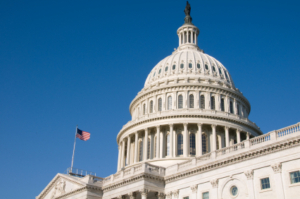PA Senate to Take Up Medicaid Work Requirement
Undeterred by past defeats, members of PA’s state senate are again attempting to advance Medicaid work requirement legislation.
This time, the proposal to impose a Medicaid work requirement will add new flexibility to such a requirement, offering exemptions for individuals deemed “medically frail” and enabling individuals who do volunteer work, attend college, or who are actively looking for work to continue qualifying for Medicaid benefits.
 The proposal will be considered by the Senate Health and Human Services Committee.
The proposal will be considered by the Senate Health and Human Services Committee.
The legislature has passed two Medicaid work requirement bills in the past but Governor Tom Wolf has vetoed them.
Learn more about this latest effort to establish a Medicaid work requirement in Pennsylvania in the PA Post article “Wolf, Republicans resume tug-of-war over Medicaid work requirements.”
 In addition, another two million people would be eligible for Medicaid if their states expanded their Medicaid program as authorized by the Affordable Care Act.
In addition, another two million people would be eligible for Medicaid if their states expanded their Medicaid program as authorized by the Affordable Care Act. According to a new Commonwealth Fund analysis,
According to a new Commonwealth Fund analysis, The new Department of Homeland Security regulation, while focused on applicants for entry into the U.S., could have the unintended effect of discouraging legal immigrants from enrolling in Medicaid, CHIP, and other government programs and even lead them to disenroll from such programs out of a mistaken concern that participating in such programs could jeopardize their status as legal immigrants. The Kaiser Family Foundation, in fact, estimates that two to three million people will leave Medicaid and CHIP because of the new regulation.
The new Department of Homeland Security regulation, while focused on applicants for entry into the U.S., could have the unintended effect of discouraging legal immigrants from enrolling in Medicaid, CHIP, and other government programs and even lead them to disenroll from such programs out of a mistaken concern that participating in such programs could jeopardize their status as legal immigrants. The Kaiser Family Foundation, in fact, estimates that two to three million people will leave Medicaid and CHIP because of the new regulation. The decline results, according to the news release, from a combination of prevention, rescue, and treatment. These and efforts, including the distribution of free naloxone, a drug that helps rescue those who have overdosed on some drugs, have been funded in part by a grant from the U.S. Substance Abuse and Mental Health Services Administration and Pennsylvania’s own Substance Use Disorder Loan Repayment Program, which assists health care professionals who work in the behavioral health field with the cost of their education.
The decline results, according to the news release, from a combination of prevention, rescue, and treatment. These and efforts, including the distribution of free naloxone, a drug that helps rescue those who have overdosed on some drugs, have been funded in part by a grant from the U.S. Substance Abuse and Mental Health Services Administration and Pennsylvania’s own Substance Use Disorder Loan Repayment Program, which assists health care professionals who work in the behavioral health field with the cost of their education. The report details individual hospital performance on these procedures, including in-hospital mortality, complications, and extended post-operative length of stay. In addition, it breaks down hospital performance for all of these measures and all of these procedures based on patient age, income, gender, geographic location, and race and ethnicity.
The report details individual hospital performance on these procedures, including in-hospital mortality, complications, and extended post-operative length of stay. In addition, it breaks down hospital performance for all of these measures and all of these procedures based on patient age, income, gender, geographic location, and race and ethnicity. The new requirements apply both to Medicaid fee for service and managed care programs and all of these steps must be completed by the end of calendar year 2019.
The new requirements apply both to Medicaid fee for service and managed care programs and all of these steps must be completed by the end of calendar year 2019. As envisioned by the state, the current program, in which individual counties contract independently with transportation providers to serve their residents on Medicaid, was to be replaced by a regional approach in which the state contracts with three vendors to serve all of Pennsylvania. Objections by members of the state legislature and county officials, however, led to legislation that requires the Department of Human Services, Department of Transportation, and Department of Aging to study the implications of such a change for patients and taxpayers and to report their preliminary findings to the legislature in September.
As envisioned by the state, the current program, in which individual counties contract independently with transportation providers to serve their residents on Medicaid, was to be replaced by a regional approach in which the state contracts with three vendors to serve all of Pennsylvania. Objections by members of the state legislature and county officials, however, led to legislation that requires the Department of Human Services, Department of Transportation, and Department of Aging to study the implications of such a change for patients and taxpayers and to report their preliminary findings to the legislature in September. According to a legislative summary prepared by one of the bipartisan bill’s sponsors,
According to a legislative summary prepared by one of the bipartisan bill’s sponsors,